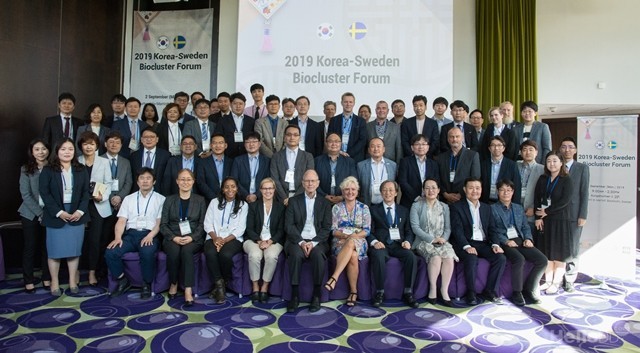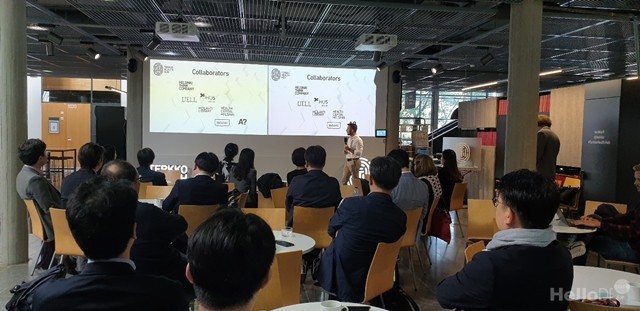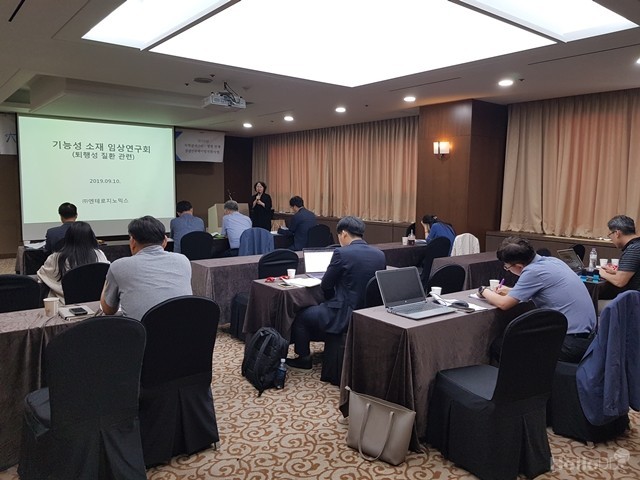
Over 60 people from the Korea Health Industry Development Institute and organizers and recipient companies of the Open-Lab Creation Project and Start-ups Incubation Project, in collaboration with Regional Clusters and Hospitals, all joined the visit. Among the recipient firms in Daejeon, E&S Healthcare (CEO, Gyeonghun Seo) and Biorchestra (CEO, Jinhyeub Ryu) took part in the tour.
The itinerary of this tour primarily occurred in Sweden and Finland. On Days 2 and 3, the KOR-Sweden Biotech Cluster Forum was held in Sweden, followed by visits to relevant organizations and a meeting with a branch director of the World Federation of Overseas Korean Traders Associations (OKTA). On Days 5 and 6, the KOR-Finland Health Industry Cooperation Seminar took place in Finland, along with B2B meetings and visits to relevant organizations.
Participants in the KOR-Sweden Biotech Cluster Forum included more than 60 Korean visitors as well as about 20 officials in the associated sector(s) from three major Swedish cities, namely Stockholm, Skane and Gothenburg, including heads of Investment Administration, Biotech and Life Science Associations. At the forum, Sweden presented its strategies to advance its regional health industry based on Karolinska Institute and Uppsala University. Held afterward were business meetings with Biorchestra, CytoDX and E&S Healthcare.
Visits were paid to relevant organizations as well, including the Research Institute of Sweden (RISE), which is an integrated research institute under the Swedish Government. During the visit, strengths of the Swedish biotech industry were reaffirmed, such as vibrant cooperation between the industry, academia and governmental supports.

In the subsequent visit to FIMM (Institute for Molecular Medicine Finland), a correlation was found between the institute’s genome information integration program that was carried out on 500,000 Finnish nationals and Daejeon Techno Park’s implementation of genome analysis system and its genome-related business model.
After concluding all the events on the official schedule, participating organizations and companies are following up on cooperation with their Swedish and Finnish counterparts.
2.Bio Convergence Center holds the “Third Start-ups Promotion Networking and Clinical Research Society Session”

“For effective drug delivery and bio-transplant,” mentioned Ms. Eunyoung Seol, the head of G2G Bio Laboratory who gave a presentation at the Clinical Research Society for Functional Materials, “research on functional materials are needed. To this end, a cooperative research society that encompasses the industry, academia, research institutes and hospitals is currently up and running.”
At the Clinical Research Society for Functional Materials, G2G Bio, Lab2Lab and Meditulip have kept on with their activities such as identification of sectoral needs for sustained-release injections and discovery of new research tasks in cooperation with Chungnam National University, Korea Institute of Machinery & Materials, Korea Institute of Toxicology and Chungnam National University Hospital.
The Clinical Research Society for Degenerative and Senile Disorders has conducted its activities to establish supportive infrastructure for training; it has come up with ideas regarding clinical testing and put out a feeler about the feasibility of a clinical test to discover treatment substances for senile disorders and clinical testing planning.
Hyunseung Lee, CEO of Hu&Chem, stated, “The prevalence rate of sarcopenia is expected to rise as societies are becoming super-aged throughout the globe. The socio-economic spending forecast due to its associated complications is that it will soar explosively.”
Dingbro has proceeded with the advancement of its system to identify a diabetic person, using the iris. Jaeyoung Cho, CEO of Dingbro, explained that “one out of two diabetic patients tend to go to the hospital after complications worsen due to failure of early diagnosis. We are in the process of developing a system that enables the ordinary public to perform cost-free self-diagnosis.”
He went on to say, “Currently, we are collecting iris data and seeking out advice on analyzing AI technology required to build the system,” and “we are committed to contributing to the early discovery of diabetics, thereby reducing social and medial costs derived from the disease.”
Networking among participants followed the interim reporting of the clinical research societies. The next session for start-ups exchanges is expected in October.
댓글 정렬